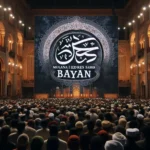History of islam in urdu is a remarkable journey that began in the 7th century CE in the holy city of Mecca and has since spread worldwide. This journey has deeply impacted humanity, establishing new social principles and a society based on justice, brotherhood, and knowledge. Let’s delve into some key aspects of Islamic history.
The Beginning of Islam and the Life of Prophet Muhammad (PBUH)
The beginning of Islam dates back to 610 CE when the Prophet Muhammad (PBUH) received the first revelation in the Cave of Hira. This marked the beginning of the final message to humanity, urging people to abandon idolatry, embrace monotheism, and follow a moral code. Through his teachings, the Prophet Muhammad (PBUH) introduced a transformative way of life, uniting people on the foundations of justice, love, and brotherhood.
| Beautiful New Naat Lyrics in Urdu |
| Hasbunallah Wanikmal Wakil in Arabic |
| Hussain Bant Rahe Hain Lyrics – (noha) |
| Surah feel with Urdu translation |
The Holy Cities of Mecca and Medina
After facing resistance in Mecca, the Prophet Muhammad (PBUH) and his followers migrated to Medina, where the first Islamic state was established. The Charter of Medina set the foundation for the Islamic system, which was based on justice, rights, and social harmony. Shortly after, Mecca was peacefully conquered, and the Kaaba was purified from idols, symbolizing a new beginning in Islamic history.
The Rashidun Caliphate and Islamic Expansion
Following the Prophet’s (PBUH) passing, the era of the “Rashidun Caliphs” began, led by Caliphs Abu Bakr, Umar, Uthman, and Ali (may Allah be pleased with them). This period saw the rapid expansion of Islamic territories beyond Arabia, spreading to regions like Syria, Iraq, Persia, and Egypt. These expansions laid the foundation for interactions between Islamic civilization and other cultures, leading to a rich exchange of knowledge.
The Golden Age of Islamic Knowledge and Science
From the 8th to the 12th century, Islam entered its Golden Age, a period renowned for significant achievements in science, philosophy, mathematics, astronomy, and medicine. Cities like Baghdad, Cordoba, Damascus, and Samarkand became intellectual hubs where scholars like Avicenna, Al-Farabi, Al-Khwarizmi, and Al-Biruni flourished. Their contributions shaped not only the Muslim world but also left a lasting impact on global knowledge and advancement.
Islamic Art, Architecture, and Social Values
Islamic culture and architecture have left an indelible mark across various regions. From the mosques of Turkey to the palaces of Spain and the architectural marvels like the Taj Mahal in India, Islamic art reflects a blend of aesthetic beauty and spiritual significance. Socially, Islam emphasizes values like justice, equality, and community welfare, forming the basis for an ethical society.
The Global Significance of Islam Today
Today, Islam is the world’s second-largest religion, with followers on every continent. Islamic scholars, organizations, and communities continue to spread its message, promoting an understanding of Islam’s true essence. Modern initiatives aim to uphold the principles of peace, harmony, and compassion, which are core to Islam’s teachings.
Conclusion
history of islam in urdu | اسلام کی تاریخ teaches us that its essence lies in justice, compassion, and service. Countless events and personalities have shaped the Islamic tradition, leaving a lasting legacy of learning and moral integrity. By following these principles, today’s Muslims can contribute to a better society and help share the true spirit of Islam with the world.
FAQs:
Islam began in 610 CE in Mecca when the Prophet Muhammad (PBUH) received the first revelation in the Cave of Hira.
The period from the 8th to the 12th century is known as the “Golden Age” of Islamic history, marked by advancements in science, arts, and philosophy.
The Rashidun Caliphs include Caliphs Abu Bakr, Umar, Uthman, and Ali (may Allah be pleased with them). They expanded the Islamic state and established a foundation of justice and governance.
history of islam in urdu | تاریخ اسلام: اسلام کا سفر
اسلام کی تاریخ ایک طویل اور شاندار سفر کی کہانی ہے، جو ساتویں صدی عیسوی میں مکہ مکرمہ سے شروع ہوئی اور آج دنیا بھر میں پھیل چکی ہے۔ اس سفر میں اسلام نے انسانی زندگی پر گہرا اثر ڈالا، نئے معاشرتی اصول و ضوابط قائم کیے، اور ایک ایسے معاشرے کی بنیاد رکھی جو انصاف، اخوت، اور علم کا پرچار کرتا ہے۔ آئیے تاریخ اسلام کے کچھ اہم پہلوؤں پر نظر ڈالتے ہیں۔
اسلام کا آغاز اور نبی اکرم ﷺ کی حیات
اسلام کا آغاز سن 610 عیسوی میں حضرت محمد ﷺ کی نبوت کے اعلان سے ہوا۔ جب آپ ﷺ کو غار حرا میں وحی ملی اور قرآن پاک کے اولین آیات نازل ہوئیں۔ آپ ﷺ نے اللہ کے پیغام کو لوگوں تک پہنچایا اور بت پرستی کو ترک کرنے، ایک اللہ پر ایمان لانے، اور اخلاقی اقدار کو فروغ دینے کی دعوت دی۔ اس پیغام نے لوگوں کو ایک جدید اور منفرد طرز حیات دیا اور انہیں انصاف، محبت اور بھائی چارے کی بنیاد پر یکجا کیا۔
مکہ مکرمہ اور مدینہ منورہ: دو مقدس شہر
حضرت محمد ﷺ کے مکہ میں دین کی تبلیغ کرنے کے بعد مدینہ منورہ ہجرت کی گئی، جہاں انہوں نے پہلی اسلامی ریاست کی بنیاد رکھی۔ مدینہ میں ہونے والے میثاق مدینہ نے اسلامی ریاست کے اصول و ضوابط کا تعین کیا اور ایک عادلانہ معاشرتی نظام قائم کیا۔ اس کے بعد مکہ فتح ہوا اور کعبہ کو بتوں سے پاک کر دیا گیا۔ اس واقعے نے اسلامی تاریخ میں ایک نیا باب کھولا۔
خلافت راشدہ اور اسلامی فتوحات
حضرت محمد ﷺ کی وفات کے بعد حضرت ابو بکر، حضرت عمر، حضرت عثمان اور حضرت علی رضی اللہ عنہم نے خلافت راشدہ کا نظام قائم کیا۔ اس دور میں اسلامی فتوحات کا آغاز ہوا، اور اسلام نے عرب کے باہر بھی اپنی سرحدیں وسیع کیں۔ شام، عراق، ایران، مصر، اور دیگر علاقوں کو اسلامی ریاست میں شامل کیا گیا۔ ان فتوحات کے نتیجے میں اسلام نے مختلف ثقافتوں اور تہذیبوں کے ساتھ رشتہ قائم کیا۔
history of islam in urdu | اسلامی علوم اور سنہری دور
ساتویں سے بارہویں صدی تک اسلام نے علم و فن کے میدان میں قابل قدر خدمات انجام دیں، جسے “اسلام کا سنہری دور” بھی کہا جاتا ہے۔ بغداد، قرطبہ، دمشق، اور سمرقند جیسے شہروں میں اسلامی دانشوروں اور سائنسدانوں نے فلسفہ، ریاضی، فلکیات، طب، اور جغرافیہ میں نمایاں کام کیا۔ اس دور میں ابن سینا، ابن رشد، الخوارزمی، اور البیرونی جیسے عظیم سائنسدان اور فلسفی پیدا ہوئے، جنہوں نے اپنے علوم کے ذریعے دنیا کو ایک نیا رخ دیا۔
اسلامی ثقافت، فن تعمیر اور معاشرتی اقدار
اسلامی ثقافت اور فن تعمیر نے مختلف ممالک میں اپنے اثرات چھوڑے ہیں۔ مساجد، قلعے، مدارس، اور محلات میں اسلامی فن تعمیر کی جھلک دیکھی جا سکتی ہے، جیسے ترکی میں آیا صوفیہ، ایران میں امام مسجد، اور ہندوستان میں تاج محل۔ اسلامی معاشرت میں عدل و انصاف، مساوات، اور خدمت خلق کی تعلیمات کو مرکزی حیثیت حاصل ہے۔
موجودہ دور میں اسلام کی عالمی اہمیت
آج اسلام دنیا کا دوسرا بڑا مذہب ہے اور ہر براعظم میں اس کے پیروکار موجود ہیں۔ عالمی سطح پر اسلام نے اپنی پہچان بنائی ہے اور اس کے پیغام کو مزید پھیلایا جا رہا ہے۔ موجودہ دور میں مسلمان علماء، اسکالرز، اور تنظیمیں اسلامی اصولوں کو مزید اجاگر کر رہی ہیں تاکہ اسلام کی حقیقی روح کو سمجھا جا سکے۔
history of islam in urdu | اختتامیہ
اسلام کی تاریخ ہمیں یہ درس دیتی ہے کہ دین کی بنیاد محبت، عدل، اور خدمت پر ہے۔ اسلامی تاریخ میں ایسے بے شمار واقعات اور شخصیات ہیں جنہوں نے اپنے کردار اور علم سے دنیا کو متاثر کیا۔ آج بھی ہمیں اسلامی اصولوں کو اپنے روزمرہ کے معاملات میں شامل کرنے کی ضرورت ہے تاکہ ہم اپنے معاشرے کو بہتر بنا سکیں اور اسلام کا حقیقی پیغام دنیا تک پہنچا سکیں۔


